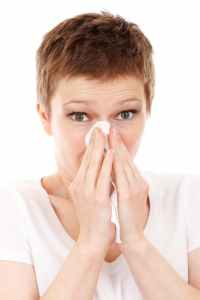Tags
Clever Homeopathy, cold, coryza, homeopathy, rhinitis, runny nose
 Coryza is commonly referred to as a runny nose and is characterized by an acute inflammation of the mucous membranes of the nose. It frequently occurs concomitant to the ‘common cold’ and may be caused by a bacterial or viral infection, or may develop as an allergic reaction to diverse allergens such as dust, pollen and others.
Coryza is commonly referred to as a runny nose and is characterized by an acute inflammation of the mucous membranes of the nose. It frequently occurs concomitant to the ‘common cold’ and may be caused by a bacterial or viral infection, or may develop as an allergic reaction to diverse allergens such as dust, pollen and others.
The inflammation in the nasal cavity increases the secretion of mucous causing the typical symptom of the runny and congested nose. There may be nasal irritation, itching, burning, and sneezing. Oftentimes there is also some involvement of the eyes with redness, watering, swelling or itching. The inflammation may extend to the larynx, bronchi and throat, producing distinctive symptomatology there. Hence the patient may generally feel run down, may develop a cough, catarrh, frontal headache, lassitude and fatigue.
Some homeopathic remedies for coryza are:
Allium cepa: This coryza is characterized by a profuse watery, acrid discharge. Distinctive for this remedy is the worsening of the coryza in a warm room. This patient is better outside. There is an accompanying eye symptomatology in Allium cepa. The eyes are watery, smarting, and burning. There may be coughing and hoarseness.
Arsenicum album: The nasal cavity feels hot and burning. There is a watery discharge. The patient is thirsty and feels weak.
Belladonna: The nose feels obstructed and there is only light discharge. Everything feels dry and sore into the throat. There may be throbbing in the head and sensitivity to light. There may be a tickly cough. Thirst is increased.
Chamomilla: This remedy is indicated where there is heat of the head. One cheek is typically red, the other pale. The coryza is usually worse at night. The little patient is fretful, and calms down only if carried about.
Dulcamara: Constant sneezing with running nose and nasal congestion. Eyes are watering and swollen. May come on from becoming chilled after exertion. Symptoms are worse outside.
Gelsemium: There is a general sluggishness and chilliness. A dull headache and drowsiness are characteristic. The eyes are heavy; the eyeballs feel lame and sore. There is watering of the eyes, sneezing and discharge from the nose. There is non-stop sneezing.
Euphrasia: The eyes are strongly affected with this remedy. There is a profuse, acrid watering from the eyes. The lids and face may become inflamed, excoriated, agglutinated. Lamplight causes photophobia. The discharge from the nose is profuse, bland, and fluent. There is sneezing, and worsening during the night and when lying down.
Eupatorium: With sneezing and headache there is aching in the bones, backache, chilliness and nausea.
Mercurious sol.: This remedy has some similarity with Arsenicum album. However symptoms are less severe and worse at night. The throat is sore there is much mucous salivation. There is aching and lameness in muscles and bones. There may be much sweating.
Rhus tox.: This is the remedy where getting wet brings on the coryza/ cold. The entire body may feel lame and may ache, especially the back and the eyelids.
References:
Adams, M. (1913) A practical guide to homeopathic treatment Philadelphia: Boericke & Tafel.
Lockie, A. (1991) The family guide to homeopathy Aylesbury: BPCC Hazell Books

Pingback: Remedies for a Runny Nose - Homeopathy Plus
You have done a wonderful job. I have read your articles on homeopathy.
Thank you!
Pingback: Remedies for a Runny Nose - Homeopathy Plus
Thank you for your post. This is excellent information. It is amazing and wonderful to visit your site. Best Homeopathy Article on Allergies.
Regards
Aura Homeopathy India
Team of Homeopathy Doctor in India
Thank you. Best wishes
Please add me to your mailing list.
Pingback: Coryza – homeopathy for the runny nose – Your Ideas Matter
Pingback: Coryza – homeopathy for the runny nose – My Blog